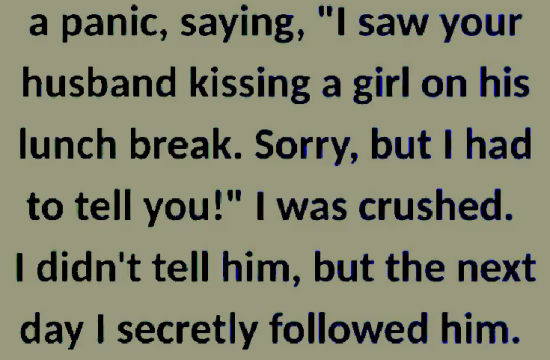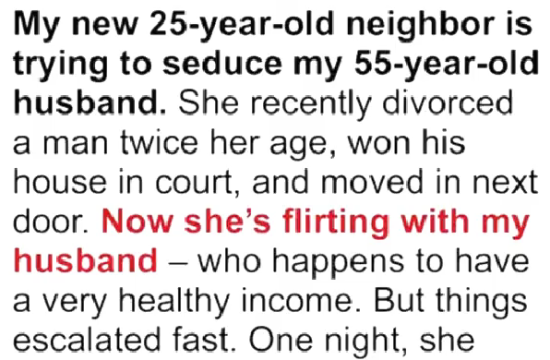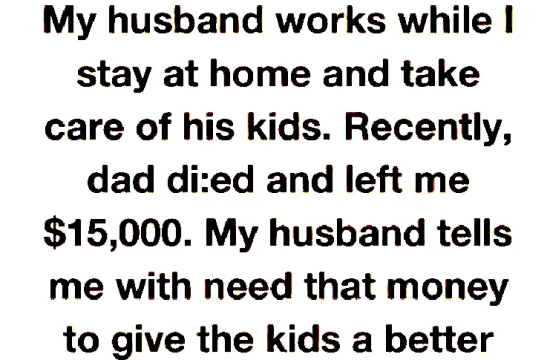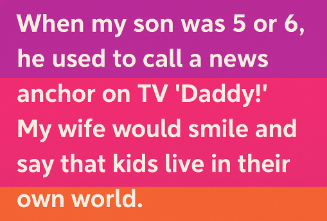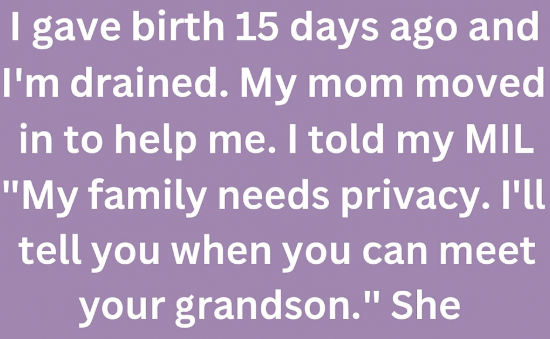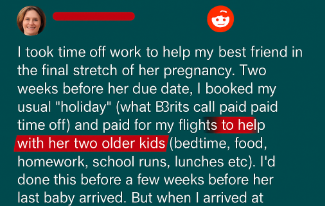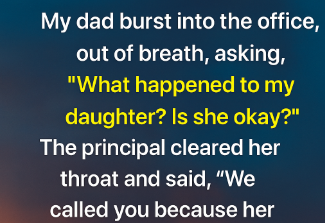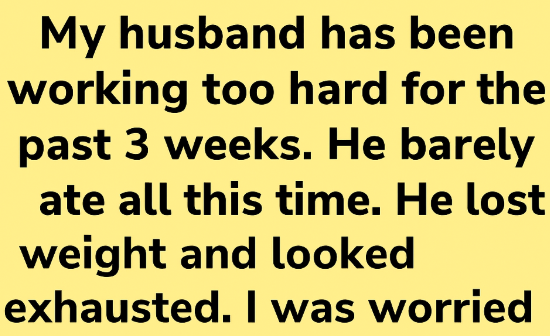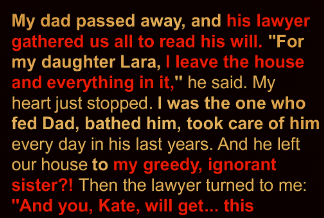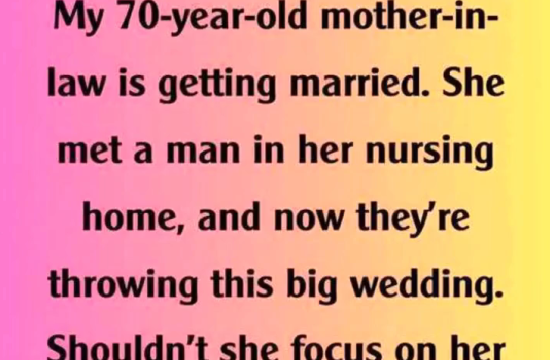I discovered my husband’s infidelity eight years ago. The betrayal shattered me. I thought my life was over. I cried into my pillow at night, muffling my sobs so my husband and kids wouldn’t hear the pain tearing me apart.
But I didn’t leave him. Not then.
I thought simply walking away wouldn’t be enough—not for what he had done. So I made a decision. A cruel one. I was going to break him, the way he broke me.
I didn’t scream. I didn’t confront him. I didn’t tell a soul—not our friends, not even my own mother. I chose silence. But not the kind that brings peace.
I became someone he couldn’t read.
I made him fall in love with me again. Every little thing he adored about me, I polished until it sparkled. I cooked his favorite meals when all I wanted was to smash the plate. I wore the perfume he liked, even though it made me sick. I smiled when he talked, laughed at his jokes, held his hand in public.
And it worked.
He came back—softened, attentive, present. He kissed my forehead every morning before work. He came home early. He’d say, “I don’t know what I did to deserve you.”
Oh, if only he knew.
I was keeping score in my head the entire time. I remembered her name, her laugh, the way he once described her as “free.” I wore my mask and waited for the perfect moment to ruin him.
A year passed. Then two. But the plan began to unravel—not because of him. Because of me.
The hatred turned into confusion. My pain dulled into numbness. And that numbness started to hollow me out. I had become so good at pretending, I no longer knew who I was beneath the act.
And then came the breaking point.
Our youngest daughter, Ella, came home crying. Her best friend’s parents were divorcing. Through teary eyes, she said, “Mommy, promise you’ll never leave Daddy, okay?”
I couldn’t breathe.
It wasn’t her question that gutted me—it was the realization that my fake marriage was shaping our children’s view of love. I wasn’t just lying to him. I was lying to them.
That night, I stared at the ceiling while he slept beside me. I wondered what my life would’ve looked like if I had walked away that very first night.
I didn’t have the answer. But I knew I couldn’t keep living a lie.
So I told him the truth.
Not all at once, but piece by piece.
We were parked by the lake we used to visit before kids. I told him I had known for years. About her. About everything.
He turned pale. “I thought you didn’t know,” he whispered. “I thought I got away with it.”
“You didn’t,” I said. “Not really.”
He didn’t deny it. He didn’t even defend himself. Just silence.
I told him about the pain. About the fake smiles and the revenge I’d plotted. I told him I had made him fall in love with me just so I could crush him.
He cried. For the first time in years, he cried like a boy who had broken something he didn’t know how to fix.
“I deserve that,” he said. “I deserve worse.”
And that’s when something in me shifted.
I wasn’t angry anymore. Just… exhausted. Tired of carrying it all.
He asked if I still loved him.
I said the only honest thing I could: “I don’t know. But I want to find out. If there’s anything worth saving, I want to see it.”
We started over. Slowly. Quietly. Not out of revenge this time—but with the hope of rebuilding something real.
We went to therapy—together and apart. It was brutal. He admitted things that still twist my stomach. And I admitted things too—like how I had emotionally checked out before he cheated.
We had both failed, just in different ways.
After three months of therapy, he brought home a journal. He’d been writing in it daily since I told him the truth. He gave it to me.
One entry stopped me cold:
“Today, I watched her laugh with our daughter. And for a second, I thought—what if I had lost this? What if she had left me? That moment alone would’ve been the hell I deserve.”
Something inside me softened. Not all at once. But enough.
Two more years went by. We stopped keeping secrets. We set boundaries. We started dating again—bowling, ice cream, coffee on park benches.
And then, just as things felt steady again, life threw another curve.
A message popped up on Facebook. It was her—the woman he cheated with.
Stage 4 cancer. She didn’t want anything. She just wanted me to know she was sorry. She claimed she didn’t know he was married. When she found out, she ended it.
I felt sick—not from pity, but from realizing I had carried so much hate without knowing the full truth.
That night, I showed him the message.
He didn’t say much. Then he asked if he could reply. Not to reconnect. Just to forgive her.
He did.
So did I.
A month later, she died.
We went to her funeral. Sat in the back. Her sister recognized me. She said, “Thank you for coming. I don’t know the whole story, but she always regretted it.”
I just nodded.
When we got home, I looked at our wedding photo. So many lies frozen behind those smiles. So much pain hidden in that frame.
But also… so much growth since.
I looked over at my husband. He was trying to help Ella with her science project, totally lost, pretending he knew what he was doing.
And I felt something warm. Not butterflies. Not infatuation. Something sturdier.
Respect.
We had walked through fire. And chose not to throw each other into it.
We chose healing over hurting.
Do I regret the cruel decision I made?
Sometimes.
But without it, I wouldn’t have seen how empty revenge really is. I wouldn’t have faced the truth about myself. Or about him. Or about what it actually takes to rebuild something broken.
Because love isn’t always soft. Sometimes it’s shattered glass. Sometimes it’s silence and therapy sessions and forgiveness you never thought you could give.
But forgiveness? That’s power. Quiet, humble power.
It’s not about forgetting. It’s not even about them.
It’s about choosing your peace over your pride.
So if you’re hurting right now, I won’t tell you what to do.
But I will say this:
Don’t bury your pain. Don’t lose yourself. And never, ever make life-changing decisions just to get even.
Revenge may feel satisfying—for a moment.
But healing? Healing lasts.
And sometimes, the strongest people aren’t the ones who walk away.
Sometimes, they’re the ones who stay—and rebuild, brick by painful brick, not for anyone else’s sake, but their own.


